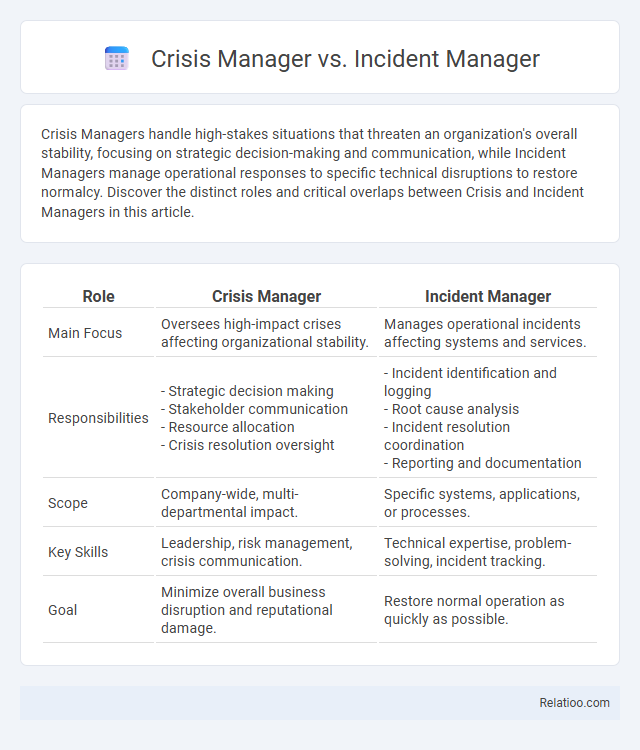Crisis Managers handle high-stakes situations that threaten an organization's overall stability, focusing on strategic decision-making and communication, while Incident Managers manage operational responses to specific technical disruptions to restore normalcy. Discover the distinct roles and critical overlaps between Crisis and Incident Managers in this article.
Table of Comparison
| Role | Crisis Manager | Incident Manager |
|---|---|---|
| Main Focus | Oversees high-impact crises affecting organizational stability. | Manages operational incidents affecting systems and services. |
| Responsibilities |
- Strategic decision making - Stakeholder communication - Resource allocation - Crisis resolution oversight |
- Incident identification and logging - Root cause analysis - Incident resolution coordination - Reporting and documentation |
| Scope | Company-wide, multi-departmental impact. | Specific systems, applications, or processes. |
| Key Skills | Leadership, risk management, crisis communication. | Technical expertise, problem-solving, incident tracking. |
| Goal | Minimize overall business disruption and reputational damage. | Restore normal operation as quickly as possible. |
Understanding Crisis Management
Understanding crisis management involves differentiating roles like Crisis Manager, Incident Manager, and Crisis Coordinator, each with distinct responsibilities. The Crisis Manager leads strategic decision-making during major disruptions, ensuring Your organization maintains stability and communication. Incident Managers focus on immediate operational responses to specific events, while Crisis Coordinators support coordination efforts to streamline response and recovery processes.
Defining Incident Management
Incident management involves identifying, analyzing, and resolving disruptions to minimize impact on business operations. An Incident Manager coordinates response efforts, ensuring timely communication and efficient resource deployment to restore normalcy. Crisis management encompasses broader strategic planning and decision-making to address significant threats, whereas incident management is tactical, dealing primarily with immediate operational issues.
Key Responsibilities of a Crisis Manager
A Crisis Manager is primarily responsible for developing and implementing strategic response plans to mitigate the impact of disruptive events on an organization's operations, reputation, and stakeholders. Unlike an Incident Manager who focuses on immediate resolution and recovery of specific incidents, a Crisis Manager coordinates cross-functional teams, manages communication with external entities, and ensures business continuity during prolonged or complex crises. Your role involves risk assessment, decision-making under pressure, and aligning organizational resources to navigate high-stakes situations effectively.
Core Duties of an Incident Manager
An Incident Manager is primarily responsible for swiftly identifying, analyzing, and resolving IT incidents to minimize service disruption and ensure system stability. Their core duties include coordinating response teams, managing the incident lifecycle, and communicating status updates to stakeholders. Your organization benefits from their expertise in restoring normal operations efficiently to maintain business continuity and reduce downtime.
Crisis Manager vs Incident Manager: Role Comparison
Crisis Managers focus on strategic decision-making during high-impact disruptions, guiding organizations through long-term recovery and stakeholder communication, while Incident Managers handle operational responses to immediate technical or security incidents, ensuring swift resolution and minimizing downtime. Crisis Managers must assess broader organizational risks and coordinate cross-functional efforts beyond IT, contrasting with Incident Managers who manage incident detection, containment, and root cause analysis within defined service management frameworks. Understanding these distinct roles enhances organizational resilience by aligning crisis leadership with incident response effectiveness.
Required Skills and Competencies
Crisis managers require advanced strategic thinking, risk assessment, and communication skills to navigate complex, large-scale disruptions effectively. Incident managers focus on tactical problem-solving, technical expertise, and rapid decision-making to resolve operational issues swiftly. Your ability to adapt these competencies according to the situation ensures successful management of both immediate incidents and broader crises.
Typical Scenarios for Crisis and Incident Management
Crisis managers typically handle large-scale, high-impact events such as natural disasters, corporate scandals, or major financial disruptions that threaten the organization's survival and reputation. Incident managers focus on day-to-day operational issues like IT outages, security breaches, or equipment failures, ensuring rapid response and resolution to minimize downtime. Your organization's resilience depends on clearly defined roles for each, enabling effective management of both immediate incidents and prolonged crises.
Decision-Making Processes
Crisis managers focus on long-term strategic decision-making to navigate complex situations that threaten organizational stability, employing comprehensive risk assessments and stakeholder communication frameworks. Incident managers prioritize rapid, tactical decision-making to contain and resolve immediate operational disruptions, using predefined protocols and real-time data analysis to minimize impact. Both roles require effective decision-making under pressure, but crisis managers emphasize broader impact assessment and integration of recovery plans, while incident managers concentrate on swift containment and resource allocation.
Collaboration Between Crisis and Incident Managers
Effective collaboration between Crisis Managers and Incident Managers is essential for minimizing organizational disruptions and ensuring rapid response to emergencies. Crisis Managers focus on the strategic oversight and communication with stakeholders, while Incident Managers handle tactical resolution of specific incidents on the ground. Seamless information sharing and coordinated decision-making between these roles enhance overall resilience and improve recovery times during critical situations.
Choosing the Right Role for Your Organization
Choosing between a Crisis Manager, Incident Manager, and Crisis Manager hinges on your organization's specific needs for handling emergencies. Crisis Managers focus on high-impact, long-term disruptions to protect your organization's reputation and stability, while Incident Managers deal with immediate, operational responses to smaller-scale incidents. Align your choice with your organizational risk profile and recovery objectives to enhance resilience and ensure effective management of unforeseen events.

Infographic: Crisis Manager vs Incident Manager
 relatioo.com
relatioo.com